Tansy Rayner Roberts's Blog, page 108
July 5, 2012
Friday Links Are Like A Phoenix – They Keep Coming Back
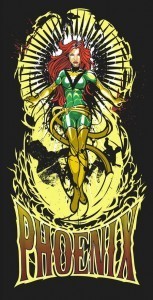 It’s not small, it’s boutique, right? For some reason the internet is not inspiring me as much as usual – it’s either residual guilt about not writing as much as I feel I should, or it’s the winter blahs, or it’s the depressing revelation that Arsenal is losing yet another captain this summer. Oh, Robin, we thought you were different.
It’s not small, it’s boutique, right? For some reason the internet is not inspiring me as much as usual – it’s either residual guilt about not writing as much as I feel I should, or it’s the winter blahs, or it’s the depressing revelation that Arsenal is losing yet another captain this summer. Oh, Robin, we thought you were different.
Still, there are a few bright spots in the pixellated aether. For a start, congrats to Robert Hoge who has recently sold his memoir, “Ugly” to Hachette, which will be published next year. (no links yet, Twitter announcement only)
Grant Watson has started an examination of how DC’s fortunes have improved since last year’s New 52 Reboot with his favourite title: Batman.
Speaking of comics, Marvel has announced it’s own New Thing What Is Not a Reboot But Will Help People Find New Comics, AKA Marvel Now, rolling out from Novemberish this year – and the thing that has everyone talking about it is the rumoured return of Jean Grey, She Who Gets Killed Off More Times Than Anyone Else. The cool thing is that the Jean Grey in question is a very early version of the character, in a title based around the concept that the original X-Men accidentally travel forward in time to Marvel Now and have to deal with modern day culture, the Twitter, low-slung jeans and the realisation that they’re all going to screw up their lives someday. Okay, maybe that wasn’t the exact wording of the press release, but it still sounds like a great jumping-on X-Men title, something I’ve always struggled to find.
Tor.com outlines the many reasons why it’s time for Jean Grey to return.
 Cherie Priest talks about Sarah Robles, the US weightlifting champion who lives in poverty because she doesn’t have the kind of glamour girl looks necessary for female athletes to attract sponsorship deals. Robles blogs as Pretty Strong, about weightlifting as well as physical strength and body image issues for girls and women and recently ran a successful Indiegogo campaign to raise funds to support her in the final month leading up to the Olympics.
Cherie Priest talks about Sarah Robles, the US weightlifting champion who lives in poverty because she doesn’t have the kind of glamour girl looks necessary for female athletes to attract sponsorship deals. Robles blogs as Pretty Strong, about weightlifting as well as physical strength and body image issues for girls and women and recently ran a successful Indiegogo campaign to raise funds to support her in the final month leading up to the Olympics.
Blue Milk talks about a female Icelandic presidential candidate who is not only the mother of three, but has a newborn baby, and that having women in leadership roles means seeing new roles for male partners.
“Icelandic women have always worked no matter how many children they have and that won’t change. It doesn’t matter what the job is or if they’re called ‘president’.”
Belinda Jack talks about the history of women and literacy, and how it’s not a new trend for people to clutch their pearls about what women (and young women in particular) might be reading.
July 4, 2012
Viewed Through a Gothic Victorian Lens
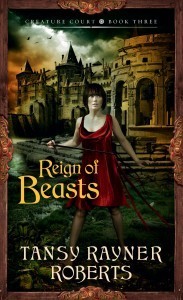 Tamara of Uncharted Pages interviewed me recently, which was great fun because she’s an enthusiastic reader of the books, and had some detailed questions to ask me. I had an opportunity to delve a bit more into my own processes as far as worldbuilding and behind the scenes systems are concerned – and by the time I was halfway through the interview I was having serious trauma flashbacks about the spreadsheet drama involved in trying to track the backstories, emotional baggage and sexual histories of a dozen or more complicated central characters.
Tamara of Uncharted Pages interviewed me recently, which was great fun because she’s an enthusiastic reader of the books, and had some detailed questions to ask me. I had an opportunity to delve a bit more into my own processes as far as worldbuilding and behind the scenes systems are concerned – and by the time I was halfway through the interview I was having serious trauma flashbacks about the spreadsheet drama involved in trying to track the backstories, emotional baggage and sexual histories of a dozen or more complicated central characters.
I miss my Creature Court. But I don’t miss the spreadsheets.
July 3, 2012
Batwoman Rules
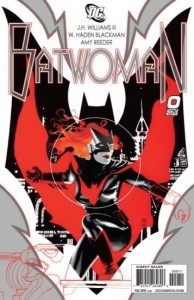 The collected trade editions of DC’s New 52 are starting to roll out, and the current title at the top of the New York Times Bestseller List for hardcover graphic novels is Batwoman: Hydrology. Yep, that book with a near all-female cast of regulars, with a lesbian protagonist who is fully dressed as she fights crime.
The collected trade editions of DC’s New 52 are starting to roll out, and the current title at the top of the New York Times Bestseller List for hardcover graphic novels is Batwoman: Hydrology. Yep, that book with a near all-female cast of regulars, with a lesbian protagonist who is fully dressed as she fights crime.
Of course, it doesn’t hurt that the writer-artist of the title is something of a creative genius who experiments gorgeously with panel design, sophisticated storylines and extraordinary, powerful artwork…
I’m still reading a handful of New 52s, but there are only three titles from the original run that I would buy in trade, despite owning all the issues electronically: Batwoman, Batgirl and Wonder Woman. Not because I am deeply obsessed by the women of the Batfamily (I’m obsessed with a lot of things, including Black Canary and Justice League International, and I don’t buy their titles currently) but because these three are the best written, most engaging of the titles I have come across – and for me, portraying women in a non-sucky way is a dealbreaker when it comes to defining good writing and engagitude.
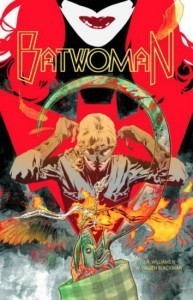 Batwoman is a brilliant title, and it makes me happy to see how many readers it has gathered, both of the female and male variety, and I don’t think it has anything to do with the occasional shower scene or lesbian clinch in the book – the characters are dealt with respectfully in the artwork as well as the script. I did suck my breath in a bit at the recent story development in which nasty things happened to a younger female hero in the ensemble, but I am trusting the writer to continue her story and allow her to have plot consequences played out, rather than disappearing her to serve the story’s hero.
Batwoman is a brilliant title, and it makes me happy to see how many readers it has gathered, both of the female and male variety, and I don’t think it has anything to do with the occasional shower scene or lesbian clinch in the book – the characters are dealt with respectfully in the artwork as well as the script. I did suck my breath in a bit at the recent story development in which nasty things happened to a younger female hero in the ensemble, but I am trusting the writer to continue her story and allow her to have plot consequences played out, rather than disappearing her to serve the story’s hero.
Also, I have to say, while the iPad and Comixology’s motion moving thing are pretty damn good for reading comics, I do think that the experience misses out somewhat on the sweeping, clever layouts of these comics (though it is kinda fun to see the panels first and the pictures they form at the end of each page).
This is the comic that shows you don’t have to treat female characters as acrobatic cheesecake body pillows in order to appeal to readers – even male readers. Funnily enough, if you apply an awesome script, great art and clever arc plotting to a bunch of characters, the readers will flock to the title even if said characters are women. And they will TELL THEIR FRIENDS.
Meanwhile, over at Galactic Chat we have put up the panel we recorded at Continuum a few weeks ago, when Grant Watson, Russell Blackford, Alice Clarke and myself had a good old chat about iconic female superheroes, where they are, and why we need them to be treated better.
I’m feeling the need for some serious female superhero bloggery… ooh, a theme! More later, then.
July 2, 2012
Big Finish in (the second quarter of) 2012
Yes, I listened to most of these in the last fortnight. Because reasons.
APRIL
The Emerald Tiger (main range)
 The new range of Fifth Doctor plays with Tegan, Turlough and an older post-Terminus Nyssa are the ones I associate most closely with my transition from occasional listener to serious subscriber. Which is odd because while I have enjoyed them and what they had to offer, I haven’t adored them with the fierce passions I feel for the plays featuring Seven-Ace-Hex or Eight-Charley, Eight-Lucie, Six-Charley, Six-Evelyn and Five-Peri-Erimem. Instead, I’ve viewed them more as an intellectual enjoyment, revisiting one of “my” classic periods of the show.
The new range of Fifth Doctor plays with Tegan, Turlough and an older post-Terminus Nyssa are the ones I associate most closely with my transition from occasional listener to serious subscriber. Which is odd because while I have enjoyed them and what they had to offer, I haven’t adored them with the fierce passions I feel for the plays featuring Seven-Ace-Hex or Eight-Charley, Eight-Lucie, Six-Charley, Six-Evelyn and Five-Peri-Erimem. Instead, I’ve viewed them more as an intellectual enjoyment, revisiting one of “my” classic periods of the show.
Not so with this latest (the third) trio of this particular TARDIS team. I adored all three plays, enjoying the characters and their interactions, and the excellent, excellent scripts. Sure, Janet Fielding is still dialling up the ocker about 3 notches too high compared to her 80′s accent, but she’s still putting in a more restrained performance than either Old Tom or Paul Darrow in the Blake’s 7s, so I’m going to give her a pass on that.
The Emerald Tiger is a wild Kiplingesque adventure romp which namechecks or references just about every classic jungle adventure writer, and provides exciting adventures with big cats, steam trains and mysterious aliens. All of the characters are given great material to work with, Tegan and Turlough taking turns to play the hero while Nyssa has a more esoteric, psychic storyline (with some very unexpected twists!) and the Doctor gets to be funny and tragic at the same time. Tegan’s best bit happens while riding an elephant.
Energy of the Daleks (The Fourth Doctor Adventures)
I enjoyed listening to this one, and the novelty of seeing Leela deal with the Daleks for the first and only time (it’s always odd to realise a companion didn’t face them, especially one who was around for a while like Leela) but I don’t remember much about it now. Not the most dynamic of this month’s stories, certainly!
MAY
The Jupiter Conjunction (main range)
Space age goodness! The energetic, dynamic TARDIS Fifth Doctor team with Tegan, Turlough and Old Nyssa (in mind if not body) now apply themselves to a great SF suspense story with politics, battles, intrigue and espionage. I love the fact that the story takes place on the back of a comet, and that the city built upon it is there purely to use it as a cheap, second class delivery service, following an elliptical orbit between Jupiter and Earth.
I also love that all of the characters are given plenty to do, and people to care about, and the way that the threads all start tangling together more and more (and characters keep getting killed off) as the plot intensifies. Eddie Robson is one of my favourite Big Finish writers and he excels at this kind of suspense/action storyline.
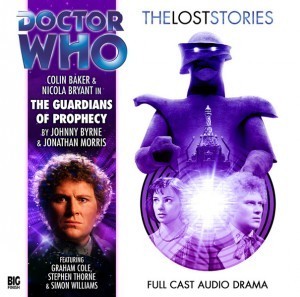 The Guardians of Prophecy (Lost Stories)
The Guardians of Prophecy (Lost Stories)
Some of the Lost Stories do have a bit of a feel of being just an audio version of a story that could have been written in the era it was intended for – which is fine, if dull. The really great ones are able to have a dual existence, giving a greater narrative weight and complexity and utilising the audio format more effectively than a mere adaptation could. The Sixth Doctor seems to benefit from many excellent Lost Stories (I recently also listened to the Nightmare Fair which is great fun) largely I suppose because he had so MANY stories cancelled before they could be made – a whole season in one go, for a start.
This one, adapted by Jonathan Morris from a screenplay by Johnny Byrne, writer of the original Keeper of Traken serial, is a sequel to that story (one of my favourites), set on the planet of Serenity, the last surviving planet of the peaceful Traken union, and goes a long way towards explaining who and what the Melkur statue/creatures were beyond a sneaky thing for the Master to manipulate. Having a sequel to the Keeper of Traken which features neither Nyssa nor the Master seemed odd at first but it works really well. The script manages to feel like a “real” Six-and-Peri story without them wanting to kill each other, or me wanting to kill either of them, so it’s like a marvellous imaginary world in which the Sixth Doctor actually got good scripts back in the 80′s.
The whole story is great, but I particularly liked Graham Cole’s performance as Ebbko, the greatest safecracker in the universe (who feels totally like a first draft version of Sabbalom Glitz). He also voices the Melkur, which is a call back to the fact that he played the physical role of the original Melkur back in the day. Did any of you know that Tony Stamp from the Bill was the Melkur?? Because I didn’t! The Extras interviews are usually worth listening to in Big Finish audios anyway, but I can thoroughly recommend them in this one because of all the value-added material of the story behind the story, and why they made the choices they did. If you’ve a hankering for the old days of mid-80′s Doctor Who (or if you think Doctor Who from this era can’t POSSIBLY be any good) then this could be the one for you.
Trail of the White Worm (The Fourth Doctor Adventures)
This is a fun, bizarre romp through the English countryside, and includes some great comic moments as well as weird, dark and creepy ones. Geoffrey Beevers is the guest star who brings it for this one, returning to his role as the scarred, angry, slimy, broken Master of the Tom Baker run, and expanding marvellously on this version of the character, often forgotten between gland reminiscences of the Delgado-Ainley variety. Also of note is another guest star, Rachael Stirling (aka Diana Rigg’s daughter) whom I remember fondly from Tipping the Velvet. She has an utterly wacked out character to bring to life in this one, and does it with great pulp fiction aplomb. (not a complete story – has a cliffhanger that leads into The Oseidon Adventure next month)
The Revenants (DWM Special Giveaway)
The download code for this one was available with Doctor Who Magazine 448 – though by past experience it will probably be available at a fairly cheap price in around a year. I didn’t have overly high hopes for this one, which features a very elderly William Russell talking about an adventure he and Barbara had (only partly with the Doctor) between the loss of Susan and acquisition of Vicki. But I was pleasantly surprised! It’s a sweet story which looks at the two schoolteachers and how uncomfortable it is for them in the TARDIS as they figure out whether or not the Doctor really wants them there, now that Susan (whom they had been dragged on board to entertain. There’s also a lot of near-fatal wading through Orkney bogland, and a clever two strand storyline based on a woman they met there, long ago, and her niece, to whom Ian is telling the story (Jeannie and Janet are both played by the excellent Sharon Small). Also some rather cool examination about where the Doctor stands on the subject of magic – and what he’s prepared to do in order to save Ian and Barbara, who really are his people now. Lovely all around.
JUNE
The Butcher of Brisbane (main range)
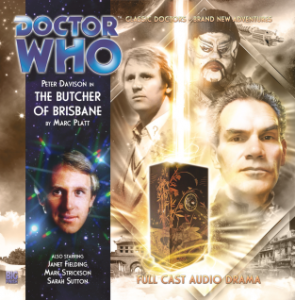 It’s been a great threesome of stories, but this one is an absolute blinder. Written by Marc Platt, the king of bonkers storylines, the TARDIS crew (5, Tegan, Turlough, very youthful looking old Nyssa) arrive in a rather horrendous 51st century post-apocalyptic Earth, in which Magnus Greel (who will some day travel back in a Time Cabinet to Victorian London, taking on the alias Weng-Chiang) is a powerful politician entanged in some very nasty business.
It’s been a great threesome of stories, but this one is an absolute blinder. Written by Marc Platt, the king of bonkers storylines, the TARDIS crew (5, Tegan, Turlough, very youthful looking old Nyssa) arrive in a rather horrendous 51st century post-apocalyptic Earth, in which Magnus Greel (who will some day travel back in a Time Cabinet to Victorian London, taking on the alias Weng-Chiang) is a powerful politician entanged in some very nasty business.
The clever twist in the tale happens up front, when an accident with the TARDIS leads Tegan and the Doctor to arrive three years later than Nyssa and Turlough – who upon being unceremoniously dumped in a snowy wasteland found themselves surrounded by falling bodies which had been sent back three years in time. Got that?
Tegan is devastated to see what has become of her beloved Brisbane in this horrible future, and both she and the Doctor are very alarmed to find that in their time apart, Nyssa has managed to get herself engaged to, um, Magnus Greel himself. But nothing is what it seems!
This is a twisty, turny, espionage-heavy story, with plenty of time dilation kinks, a mad scientist, and a few hefty doses of Chinoiserie to explain away Greel’s weird obsession with antique Chinese artefacts once he gets back to the 1970′s interpretation of Victorian London in The Talons of Weng Chiang. It’s all cleverly pieced together, with more villains than one might expect, some earnest freedom fighters, and the rather worrying revelations about Nyssa and Magnus’ relationship.
So many, many things to like in this! Turlough as a civil servant is marvellous, and I am enjoying the way that the show is building up his friendship with Nyssa, whom he barely got to overlap with in the original series. The Doctor gets some great material opposite not Greel at all, whom he is mostly kept apart from, but the sinister and morally repugnant Dr Findecker, who is responsible for some nasty time experiments. The post-apocalyptic Brisbane has its… problematic moments, speaking as an Australian, with the ocker dingo soldiers possibly the hardest aspect to swallow (but probably fair enough considering the race issues with the original Weng Chiang story – obviously Greel comes from a weird future where racial stereotyping is the norm), but I still enjoyed those parts very much.
Also the fact that they travel all over the place, from Peking (named back from Beijing, I imagine to make a quirk of Talons make sense) to Finland and back to Australia again, giving a real sense that they are visiting a world, not just one set. There should be more of this in the audio stories, given that they don’t have to pay for all the different settings!
My only quibble is that Tegan is obviously still keeping Nyssa’s marriage a secret from the Doctor, as mentioned I think back in one of the previous trilogies, as if it’s this Big Thing, and I think it has been over telegraphed as A Shocking Secret when in fact it shouldn’t be that big a deal. Certainly not enough for Tegan to be talking about it in such an Ominous Tone of Voice.
Still, I’m delighted they don’t seem to be stopping this run any time soon. More please!
Power Play (Lost Stories)
Another Sixth Doctor story that was supposed to happen at some point but didn’t, this reunites the Doctor with old companion Victoria, played by Deborah Watling. It’s an odd duck, and I’m not quite sure what it’s trying to say about nuclear energy (it’s probably fairer to nuclear power sources than any other Doctor Who story, but tries to cover all perspectives, which leaves it feeling a bit odd and fence-sitting). Peri gets a reasonable amount to do, for a Lost Story, but it’s really not one of her showcase pieces. Victoria’s plot is just plain weird. I like that she’s involved in power protestors etc. and that much is made of the fact that she’s not only old now, but was born far earlier than someone of her age should have been – she’s from the Age of Steam, now dealing with the Nuclear and Information Age, which is quite fun. And I appreciate the fact that it’s about who her character might be now, not whom she might have been in the 80′s. Her relationship with the much younger protesters who think of her as a Mum figure and call her “Vic” is all very cute.
But… she spends most of the story either hypnotised, or trying to kill the Doctor, or generally befuddled, and I feel like the character was a bit wasted considering what a big deal it is (or should be) to see the Doctor again. I’m particularly skeptical that the Doctor should convince her to recognise him by looking in his eyes rather than, you know, talking her into it like he normally does when reuniting with people. I also feel like the writer didn’t want to go out on a limb and give us any hint as to what Victoria’s life had been like for the last 40 years or so, which was disappointing. I enjoyed the story while listening to it, but ended up feeling a bit flat about the whole thing.
The Oseidon Adventure (The Fourth Doctor Adventures)
IT’S THE KRAALS! I think I’m the only Doctor Who fan who counts The Android Invasion amongst my very favourite stories, and it should be of no surprise to anyone that they work very well over audio. Of course the Master would work with them. This is the second of the two parter including Trail of the White Worm, although the two stories don’t have a lot to do with each other. The best part of this is the psychological depth given to the various android replicas of the Doctor and the Master, and the idea that once you put enough of the history and knowledge of someone into an android figure, it’s going to take on a lot of their personality and attributes too. So making androids of your enemies? Not such a great plan! Making androids of yourself when you’re an untrusting, slightly evil megalomaniac? Even WORSE plan. Possibly this one edges too much towards the silly which is a problem when dealing with the Master, but he is rather ruffled and adorable, and I love the vibe between Tom Baker and Geoffrey Beevers.
HOTTEST RECOMMENDATIONS FOR THE QUARTER:
The Emerald Tiger
The Jupiter Conjunction
The Butcher of Brisbane
The Guardians of Prophecy
July 1, 2012
Goodbye Dr Liz Shaw
 We’ve lost many actors and creators from Classic Who over the last couple of years. When Elisabeth Sladen died, I was gutted, and simply couldn’t talk about it. Her character had been so important to me as a child, and had continued to be relevant and important through my adult life. The fact that she was still working, still playing the character on screen, made it more immediate. I never blogged about the loss of Elisabeth Sladen, or talked about it much, and even turned down the request to give a toast in her honour, because I couldn’t find the words.
We’ve lost many actors and creators from Classic Who over the last couple of years. When Elisabeth Sladen died, I was gutted, and simply couldn’t talk about it. Her character had been so important to me as a child, and had continued to be relevant and important through my adult life. The fact that she was still working, still playing the character on screen, made it more immediate. I never blogged about the loss of Elisabeth Sladen, or talked about it much, and even turned down the request to give a toast in her honour, because I couldn’t find the words.
Only when I heard in the last week that Caroline John had died did I start thinking about how important her character had been to me, too. I’m a lot less emotionally invested in Liz Shaw as a character, but she was a huge influence and role model for me – specifically the Liz Shaw of Spearhead from Space, the story which rebooted Doctor Who from the black and white 1960′s to the colour 1970′s.
Everyone remembers the Jon Pertwee era of Classic Who as being about the Doctor, representing the hippies and the scientists, in regular conflict with the Brigadier and UNIT, representing the military solution, despite taking resources from them without any apparent qualms. In fact, the Brigadier is quite accommodating to the Doctor, who rarely does more than roll his eyes at the use of guns in dealing with aliens, and the two of them riff good-naturedly against each other while saving the world.
 Liz Shaw, who is our point of view story for a large part of Spearhead from Space, criticises the military and their way of doing things more in that first story than I think the Third Doctor does for his entire five year run. She is cynical and amused by UNIT and its military solutions, but also very much a skeptic about aliens, who has to learn fast that she is wrong (about the aliens thing) and adapt. Which she does – she may start out as something of a Dana Scully, but once she sees what is happening, her scientific mind proves to be more than up to the challenge. She is an assistant to the Doctor, yes, but she is very much portrayed as his intellectual equal, and while she never wanted to be part of UNIT, the scientific challenge is enough to keep her around (for a while).
Liz Shaw, who is our point of view story for a large part of Spearhead from Space, criticises the military and their way of doing things more in that first story than I think the Third Doctor does for his entire five year run. She is cynical and amused by UNIT and its military solutions, but also very much a skeptic about aliens, who has to learn fast that she is wrong (about the aliens thing) and adapt. Which she does – she may start out as something of a Dana Scully, but once she sees what is happening, her scientific mind proves to be more than up to the challenge. She is an assistant to the Doctor, yes, but she is very much portrayed as his intellectual equal, and while she never wanted to be part of UNIT, the scientific challenge is enough to keep her around (for a while).
And oh, it burns me every time one of them calls her Miss Shaw. I know it’s the 70′s, but she’s a freaking DOCTOR, she earned that title, and the script still occasionally treats her like she’s a dolly bird brought in to make the tea (though that, of course, is Benton). Still, Caroline John rose above it, and despite the mini-skirts and big hair, proved to be a capable and inspiring female scientist.
More importantly, she left. Now, Caroline John left for two reasons – because the production staff felt that having a companion who was the intellectual equal of the Doctor wasn’t the direction they wanted to go in, and also because the actress was pregnant and needed to quit in any case. Because this was decided after the filming of Season 7, there was no ‘final’ story, no leaving scene for Liz Shaw. Fans have often complained about this, because that is what fans do. But I kind of love the way she’s written out – the beginning of Terror of the Autons, the first story of the next season, makes it clear that Liz has gone back to Cambridge to continue her work, and that the Doctor isn’t happy about it.
She has, in short, better things to do. “It was fun, Doctor but… I’m busy.” (The Brigadier even says at this point that she was overqualified for the role as the Doctor’s assistant as he only needs someone to pass him test tubes and tell him how brilliant he is – which feels like a bit of a dig at the behind the scenes decision!) Liz’s independence is part of what makes her such an original and awesome companion character, and the critical regard so many viewers have for season 7 has a lot to do with the role that she played.
i09 article on How Caroline John Helped Save Doctor Who.
Calapine posts about Caroline John and Liz Shaw and provides time stamps for the following long YouTube interview:
A lovely tribute to an unforgettable character, and an important woman in the history of Doctor Who, by Babelcolour:
Angelic News
 Island Magazine has partnered with the Festival of Voices and MONA to present Angel Story, a one-night-only event of heavenly tales that unlocks the power of language and the beauty of words. I’m happy to announce as alluded to last week that my short story, “Please Look After This Angel,” is one of the three finalists selected to be “performed by Moira Smiley and VOCO at a unique ephemeral experience at MONA that will live on in your memory far beyond the last word.”
Island Magazine has partnered with the Festival of Voices and MONA to present Angel Story, a one-night-only event of heavenly tales that unlocks the power of language and the beauty of words. I’m happy to announce as alluded to last week that my short story, “Please Look After This Angel,” is one of the three finalists selected to be “performed by Moira Smiley and VOCO at a unique ephemeral experience at MONA that will live on in your memory far beyond the last word.”
Also, publication in Island Magazine, which is a new and amazing thing for me!
What: Angel Story
Where: Nolan Room, MONA
When: 8pm Wednesday 11 July
They are expecting the event to sell out fast, so get going to secure your ticket if you’re Hobart-based and interested in coming along! [Tickets: $38 + booking fee? via Centertainment]
June 30, 2012
Big Finish in (the first quarter of) 2012
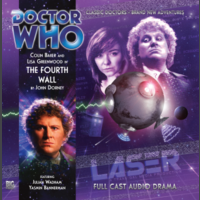 Here we are again, my twice-yearly review of the “current” monthly releases from Big Finish that I have heard. As usual I’ve been listening to plenty of backlist titles too (I’m still not caught up on Jago and Litefoot and Bernice Summerfield, for example, as well as series like Graceless, so won’t listen to the current releases any time soon even if they are doing alluring things like casting Arthur Darvill), but given that I do listen to a lot of the current range as they are released, it’s nice to put it in some sort of chronological order.
Here we are again, my twice-yearly review of the “current” monthly releases from Big Finish that I have heard. As usual I’ve been listening to plenty of backlist titles too (I’m still not caught up on Jago and Litefoot and Bernice Summerfield, for example, as well as series like Graceless, so won’t listen to the current releases any time soon even if they are doing alluring things like casting Arthur Darvill), but given that I do listen to a lot of the current range as they are released, it’s nice to put it in some sort of chronological order.
There really are a lot of them, so I’m splitting the post into two quarters, or it would be the world’s LONGEST audio review. I may consider doing them monthly after this, which means fewer reviews as I don’t always manage to listen to everything in the month it’s released (I’ve only just been able to catch up with some plays of the last 3 months because my subscription had lapsed and I couldn’t afford to resubscribe for a while).
JANUARY
The Curse of Davros (main range)
The first of the official adventures with new girl Flip Jackson travelling with the Sixth Doctor. I was a bit wary of this combination at first because I didn’t remember Flip much at all from the story she first appeared in (The Crimes of Thomas Brewster), because I think Big Finish’s great strength is that it is far less attached to the idea of the Doctor Who companion being an English girl in her late teens/early twenties, and because the same story had tough-talking DI Patricia Menzies in it, and I long for her to travel with the Sixth Doctor like you wouldn’t believe.
But this year’s batch of Main Range Doctor Who scripts are particularly strong, Flip has some great material, and the actress playing her is fun. This story is notable because it does something with the Doctor-Davros relationship never before done, and I’m not going to say WHICH classic SF trope it is, because figuring it out is part of the charm of the episode. But Old Sixy, as Colin Baker calls him, is particularly good with Davros as an enemy (they get to be pompous at each other) and there’s some lovely material here for both he and Terry Molloy to shine.
Destination: Nerva (The Fourth Doctor Adventures)
A fun but rather ordinary space adventure. I like the re-use of Nerva Station, and the hints of the larger universe as it continued on after the classic TV adventures on the station, but apart from it being fun to hear Tom Baker & Louise Jamieson back in the saddle after so many years (he is more Voicey than he was on the television but I’m used to that after all his other audio work, including the stuff he did in the 70′s – she is brilliant, as if she hasn’t aged a day.)
The Fourth Doctor Lost Stories Box Set: The Foe From the Future, and The Valley of Death
The website says these came out last October but I’m pretty sure that release was delayed so they only arrived in January – which was a bit odd because it collided with the delivery of the first of the Fourth Doctor Adventures, so it was all a bit confusing. Unlike the Adventures, which follow the old Eighth Doctor Adventure/modern TV format by being an hour long single story, the Lost Stories are 4 episodes long. Also, Lost Stories are always based on original scripts or storylines which came close to being produced, which can often mean that they feel a touch old fashioned in comparison with other Big Finish stories. I do think it was a mistake to mix up two series featuring Tom Baker and Louise Jamieson as the Fourth Doctor and Leela – while I love the pairing, having both at once was a bit confusing, and I suspect that it’s hard for the Lost Stories to compete with the more cool and snappy Adventures – though people who are in this for the old school nostalgia may well prefer the Lost Stories. Though to be fair apart from the format, there isn’t a lot of tonal difference between the two series – with the other Lost Stories, we can see a clear distinction between say Old School Sixth Doctor and New Cuddly Sixth Doctor, but I suspect these have been homogenised because they are still in the early phases of Writing Big Finish Tom.
With these, I enjoyed the Foe from the Future very much, I suspect because of the excellent adaption work by John Dorney, who among other things rewrote several characters to be female, specifically so the story wouldn’t be Leela running around with a bunch of men, as often happened in this era. I especially liked Charlotte from the village, the only character in this Year of Tom Baker who seriously made me wonder if they are going to give Tom an original new companion to play with, as well as doing stories with the actors from his era who are still alive. The collision of English village and space story was also great fun. I will confess that I can’t remember much about the other story, Valley of Death, though I enjoyed it at the time. The standout part of it was getting to see Leela’s reaction to travelling on an airplane.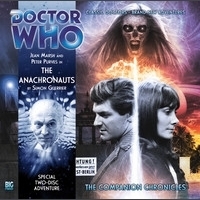
The Anachronauts (companion chronicle)
I’ve already talked about this one as the Companion Chronicle that got me on to a Jean Marsh kick, and a Dalek Masterplan kick, and so on. It’s a lovely fun story set in one of the cracks between episodes of that classic 60′s serial, capturing the characters of Sara and Steven extremely well, and making me fall in love with both of them all over again. It’s the strength of this story which led to my partial disappointment in the first half of the audiobook of the Target novelisation of Dalek Masterplan. I hope they give Peter Purves and Jean Marsh more chances to work together as they spark excellently off each other’s characters, and I do love Companion Chronicles with two companions instead of one – especially for the 60′s characters, where that was the norm. (Though a Jo-and-Yates or Jo-and-Benton story from the Third Doctor era would be fabulous).
The section of the story set in Berlin is marvellous, and I loved the twist about the setting, which took the risk of writing in some unrealistic things and then sneakily pulling the carpet out from under the listener. Plus, Sara Kingdom and Steven Taylor running around Berlin on the wrong side of the wall (from safety and the TARDIS amongst other things) is lovely and fits in very well with the crazycakes second half of their time-hopping original story together.
FEBRUARY
The Fourth Wall (main range)
My favourite of the Flip stories so far, this one has an ingenious central device, messing around with entertainment technology and using the audio format to do all kinds of clever things that might possibly work on screen, but not to the same extent. Also, killing off the companion this early – bold move, Big Finish! I almost bought it, except that we all knew she’d be back next month… maybe this one should have been third of the trilogy?
Anyway, the Sixth Doctor is terribly good in this and I do admit to being convinced that Flip is good for him, even if she’s not a cranky 30 something Detective Inspector, or Charley or any of my other favourites.
The Renaissance Man (The Fourth Doctor Adventures)
A lovely, creepy story of collectors and sinister eccentrics around a Museum in an English village. I love the Hinchcliffe vibe to this one, and the fantastic character work by the cast. Again, Louise Jamieson’s Leela is a standout.
The Liberator Chronicles Vol. 1: The Turing Test, Solitary, Counterfeit
Blake’s 7 is back! I was so excited about this when it was announced. At this stage the stories are done narratively, Companion Chronicle style, with two characters playing off each other. There is at least one full cast story available for pre-order now though!
The best of this first series is The Turing Test, which manages to feel like it’s a slightly more grown up story of the first season of the show, while at the same time revealing something important about Avon’s character and taking him on something of an emotional journey, which is pretty impressive considering all the actual personal revelations about his past didn’t come out until seasons 2 and 3. Honestly I could listen to Paul Darrow read the phone book, but I’d be worried he might sprain his eyebrows from arching them while doing so. Having Vila there too was nice, as their dynamic remains one of the best things about the original show.
Michael Keating is the one who sounds most natural and like his 1978 character, and while Solitary wasn’t quite as gorgeous a script as The Turing Test (which I think gave him better material, as did the ability to riff off Avon), it was still very good. Counterfeit has a lot of Blake in it, so it was never going to be my favourite – I need to go back and listen to it properly because come on, it has Avon in it, but I found it a bit slow the first time around, and didn’t take much in.
I am very excited that the NEXT series of these will have female characters Cally and Servalan in it, as their absence was pretty notable here – it was disappointing to have an all male line up, and only one substantial female character (in the Turing Test, not played by a female voice).
MARCH
Wirrn Isle (main range)
I do love a callback to classic monsters, most of which work better in audio than they ever did on screen. Though as a Target novelisation girl I do rather think there should be a third ‘r’ in Wirrrn. This is a rather lovely base under siege story, using an icy post-apocalyptic Earth setting, and setting off one of the more disgusting of the Doctor’s classic foes. I liked the whole Swiss Family Robinson aspect to the story, and the use of transmat technology in various inventive and kind of freaky ways.
Also, it’s nice that Flip gets to have another young female character to interact with, and we get to see her put through the absolute wringer. Both she and Colin Baker are very good, relishing the crunchy material in the script.
The Wrath of the Iceni (The Fourth Doctor Adventures)
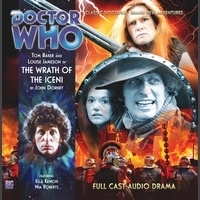 The first really breathtaking script for the Fourth Doctor and Leela in this run, and it’s no coincidence that it’s also one that showcases Leela’s character by teaming her up with the legendary Boudicca. I love that we have a story in which it makes complete sense that the Doctor and Leela would be divided – of course they are going to see Boudicca and her warrior ways completely differently! It’s the first real challenge between them, and both actors handle the meaty emotional script without breaking character. Ella Kenion’s portrayal of Boudicca is fantastic, bringing the ancient queen to life, and never flinching from the darker edge of her story, or her ruthless spirit.
The first really breathtaking script for the Fourth Doctor and Leela in this run, and it’s no coincidence that it’s also one that showcases Leela’s character by teaming her up with the legendary Boudicca. I love that we have a story in which it makes complete sense that the Doctor and Leela would be divided – of course they are going to see Boudicca and her warrior ways completely differently! It’s the first real challenge between them, and both actors handle the meaty emotional script without breaking character. Ella Kenion’s portrayal of Boudicca is fantastic, bringing the ancient queen to life, and never flinching from the darker edge of her story, or her ruthless spirit.
IN SUMMATION:
Pretty much everything I listened to in this quarter works as a standalone – you might enjoy listening to the whole Flip trilogy in order but there isn’t such huge connection between the stories that you need to.
HOTTEST RECOMMENDATIONS FOR THE QUARTER:
The Anachronauts
The Fourth Wall
The Wrath of the Iceni
Blake’s 7: The Turing Test (though cough, you can’t actually buy these separately from the Liberator Chronicles)
Clarion Write-a-thon Week 2 – the second 5000.
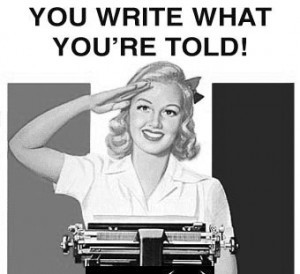 Words are dragging for me right now. I made my second 5000 words by dragging it out, 100 words at a time, as painfully as any job can be which involves you sitting at a desk with nice hot cups of tea and the internet to distract you every ten minutes.
Words are dragging for me right now. I made my second 5000 words by dragging it out, 100 words at a time, as painfully as any job can be which involves you sitting at a desk with nice hot cups of tea and the internet to distract you every ten minutes.
I love my novel, I’m happy with it and I even know where it’s going, but despite fun scenes involving drunken brothers, enchantresses and governesses and bratty girl scientists aren’t inspiring me to drill out the words at what I consider a reasonable rate. For some reason I’m hiding from the book, though, and instead turned most of my writing attention this week to a long-neglected chapter of a co-writing project (we’re at the point where the plot has to make sense, ouch!), a children’s novel that’s been kicking my butt because research, a short story or two and a comic script.
Hey, I never said the 5000 words would be on the same project! (I hope I didn’t say that)
On the one hand, allowing myself to count the wordcount of all fiction projects isn’t encouraging me to stick to a single thing and bash at it until it’s done, but on the other hand, my brain is so flighty right now that if I forced myself to just write ONE thing, I think it would flutter away altogether. I’m not sure what’s going on – the obvious diagnosis is post-trilogy meltdown, but I’ve written a whole NOVEL since then, the Creature Court was put to bed from my point of view more than a year ago, so I don’t think it’s that.
What I want to be doing is editing, I think. And other writing related things. But not actually producing wordcount. Having said all that, there are so many things I WANT to get written this year, and if I let myself completely follow my own whims, I’ll have a couple of short stories and not much else to show for it. So I’m going to keep pushing my way through the Clarion Write-a-Thon plan, in the hope that I eventually do embrace my novel as she deserves, and afterwards I think I will collapse and look at some writing-support type work for a while, to refresh me before Nanowrimo comes my way. I think my original crazy plan of writing 200K this year might have to fall by the wayside.
Far more important that I write sustainably, don’t burn out my synapses, and that what I produce is publishable.
But oh, I am enjoying writing short stories on spec again. It’s been so very long…
—
If you want to encourage my Clarion Write-a-thon campaign, please consider donating a little something in my name over here. All funds go towards the Clarion West writers workshops, a great cause!
June 28, 2012
Friday Links is on the Side of the Bronies
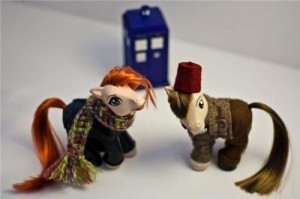 Tor.com on In Defense of Bronies – the Quest for Gender Equality in Fandom. The patriarchy hurts men too, especially men who like cool cartoons about adorable ponies!
Tor.com on In Defense of Bronies – the Quest for Gender Equality in Fandom. The patriarchy hurts men too, especially men who like cool cartoons about adorable ponies!
Alisa on The Knitting Olympics, and why the spat between the Olympics committee and Ravelry is a feminist issue for her.
Jennifer Crusie, queen of the collage-your-novel technique, talks about brainstorming with yarn, and other art and craft. It’s all about YARNSTORMING!
Bluemilk responds to the Atlantic article about Women Having It All, pulling the best points from the article and providing a bunch of links to interesting followup blogs.
The fabulous epic fantasy writer Karen Miller talks publishing, fantasy and feminism in Five Questions.
Malindo Lo crunches the numbers on LGBT representation in YA fiction this year.
Sarah Rees Brennan talks about her favourite urban fantasy lady sleuth. She also quotes a piece from an amazing graduation speech by the recently departed Nora Ephron, about feminism and the necessary vigilance of women.
Diana Peterfreund looks at Battle Royale, and compares the execution of the central concept as compared to The Hunger Games. (like me she was annoyed by the lazy criticisms made of the Hunger Games franchise, mostly by people who hadn’t read the books) Surprise: execution MATTERS.
Futurama
Get More: Comedy Central,Funny Videos,Funny TV Shows
June 27, 2012
Art, Writing & Literary Awards: In It For The Money
I’ve been talking with people a lot lately about money as currency, and time as currency, and how the two things don’t always have a straightforward exchange rate. And since Twitter blew up again today with a whole bunch of drama and insults associated with indie publishing and money, it seems like the right time to have this conversation online as well.
Because if there’s one thing that drives me crazy as a working writer who isn’t actually trying to earn a living entirely from her craft right now but would REALLY LIKE TO, it’s the idea that as soon as writers and publishers start looking at the business side of things practically, and expecting to be paid a reasonable and sustainable amount for their time and effort, they are somehow selling out.
Money matters. Paying artists matter. Too often, writers and artists are sent out into the world without any kind of business background, because there’s this stupid romantic idea that as soon as you start treating your art like a business, it stops being art.
Personally, I’m in it for the money. Oh, don’t get me wrong. I don’t expect to be J.K. Rowling here. I don’t crave mansions or film deals or any of that craziness. But if I can’t earn an income from my writing, then how can I justify spending so much time doing it?
I’m incredibly lucky to have a partner who supports me financially, and ways of earning money myself aside from my writing, including a small amount of government assistance because I’m a mother. While I’d sure like to have more money to be able to help pay off the mortgage before my partner hits retirement age (and crucially before our daughters hit university age), and to travel, and to buy pretty trinkets, we’re in the fortunate position of having just enough to meet our basic needs, with a few nice extras here and there.
So my primary currency isn’t money, it’s time. We pay actual cash money to put our youngest in daycare two days a week, so I have time to work. The exchange rate isn’t the best, but it’s worth it to us. But the hours I spend writing aren’t just taken from the daycare jar, they are pinched and borrowed from our daily life. The time I spend writing is time I don’t spend with my children, or cleaning the kitchen, or organising the cupboards, or doing all those many, many things that part of me thinks I should be doing.
My youngest daughter is only two for another month. She’ll only be three for a year. And while I don’t believe that the perfect mother is one who spends 24 hours a day with her children (I know I would be far less than perfect if I did that!) I’m still well aware that the time I spend writing is taken directly away from my kids while they’re young.
I couldn’t justify that if it was just about the art. “I’m making art here, sweetie, so no, you can’t fingerpaint, because it would take too much time to clean up, and it’s either I cook dinner OR I clean the floors, not both, because I’m busy over here. Making art.”
Art is important, but not important enough for me to spend precious weekday daylight hours on it for its own sake. I can barely justify time to myself to read a book, how on earth could I justify that?
I received word this week that I had sold a short story to a literary magazine I had never sold to before (more on this when I can announce it) and it will be read in public by actors, which is squeeful and amazing, but also it will earn me $250. I’ve sold less than a handful of stories before at anything near that rate – only two have ever sold for more – and while my artist’s soul appreciates the honour and the excitement at having my story publicly presented, and my ego is dancing at the thought of selling to that particular, thought-it-was-out-of-my-league magazine, when it comes down to it, it’s the $250 that makes me think, yeah, I’m on the right path.
In a perfect world, art for art’s sake would be a currency all on its own. But we’re not living in that world right now. Check out what’s been happening with the Queensland Literary Awards – the first thing the new Premier did was cut their budget, making a very public statement that the arts were not important to the current government. But the people have decided otherwise, and they’re putting their money where their mouths are, contributing to a Pozible campaign to get the damned awards refunded again.
Money matters to art. It’s not everything, but it matters, and anyone who tells you otherwise is selling something.



